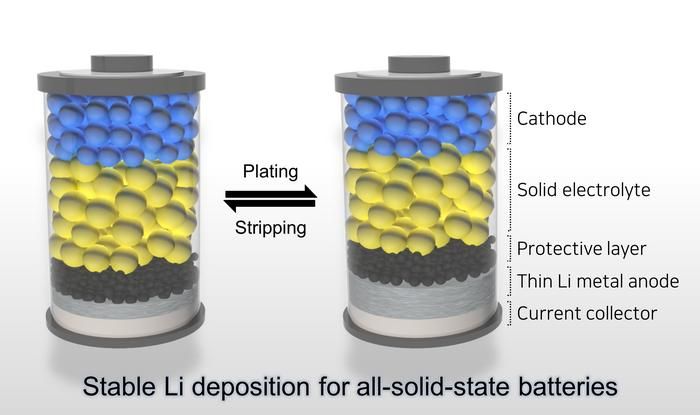A research team consisting of Professor Sujin Park from the Department of Chemistry, doctoral student Sangyeob Lee from the Department of Advanced Materials Science, and Dr. Sungjin Cho and master's student Hyunbin Choi from the Department of Chemistry at Pohang University of Science and Technology (POSTECH) as well as Dr. Jin Hong Kim and Dr. Hongyeul Bae from POSCO N.EX.T Hub recently succeeded in improving the performance and durability of solid-state batteries. This breakthrough was made possible through the use of a new process called “lower electrode placement.” The results of the research were published in the international journal “Small”.
Schematic representation of a lithium metal anode battery installation by bottom electrolysis mechanism
Bostic
Secondary batteries used in various applications such as electric vehicles and energy storage systems are generally based on liquid electrolytes. However, the flammability of liquid electrolytes poses a fire hazard. For this reason, research is currently underway to use solid electrolytes and lithium (Li) metal in solid-state batteries, providing a safer option.
When solid-state batteries operate, lithium is applied to the anode and the movement of electrons is used to generate electricity. During the charging and discharging process, lithium metal goes through a cycle in which it loses electrons, turns into an ion, regains electrons, and then returns to its metallic form via electrolysis. However, random electrolytic deposition of lithium can rapidly deplete available lithium, greatly affecting battery performance and durability.
To solve this problem, the research team, in collaboration with the POSCO N.EX.T Hub, developed an anode protection layer consisting of a functional binder (PVA-g-PAA) for solid-state batteries. This layer displays exceptional lithium transport properties that prevent accidental electrolytic deposition and promote the “underlying electrolytic deposition” process. This ensures that the lithium is evenly deposited from below the anode surface.
Using a scanning electron microscope (SEM), the research team performed an analysis that confirmed the stable electrodeposition and separation of lithium ions. This significantly reduced unnecessary lithium consumption. The solid-state batteries developed by the team also demonstrated stable electrochemical performance over long periods of time, even with lithium metal thicknesses of 10 micrometres (μm) or less.
“We have developed a robust all-solid-state battery system through a new electrodeposition strategy,” said Professor Soojin Park, who led the research. “As more research is conducted, we want to find more effective ways to improve battery life and increase energy density,” he added. Based on the results of the collaboration, POSCO Holdings plans to commercialize lithium metal anodes, a key material for the next generation of secondary batteries.
Note: This article was translated using a computer system without human intervention. LUMITOS offers these automatic translations to deliver a wide range of breaking news. Since this article was translated using machine translation, it may contain vocabulary, syntax, or grammar errors. You can find the original article in English here.
Original post

“Certified tv guru. Reader. Professional writer. Avid introvert. Extreme pop culture buff.”






More Stories
AI-powered traffic lights are now being tested in this city in Baden-Württemberg.
The use of artificial intelligence in companies has quadrupled
AI Startup: Here Are Eight Startup Ideas